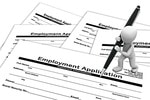Getting fired can lead you down one of two roads. First—and this is the one that’s probably been playing on your mind a lot—you could end up set back for decades, earning less than you could be, and working a job you don’t like. Admittedly, this does happen. But it doesn’t have to happen to you.
The second road you could head down is a positive one. You can deal with your emotions, find any good reference you can, and start a new career from scratch. You might have to gloss over the fact that you were fired. But getting fired isn’t a crime—you’re not a criminal, and you deserve work like everybody else.
If you’re considering resigning before being fired, here is some advice on the subject.
[su_list icon=”icon: check-circle”]
Can Termination Affect Future Employment?
First things first: can termination affect future employment? And can you apply for the same job after being fired?
There’s nothing stopping you from applying for the job you were sacked from. But there’s little point. If you worked at a large business, then the reasons for your dismissal will be on file. And if you worked for a small team, then they’ll remember you and why you were sacked. As such, you won’t have any luck if you reapply.
In terms of finding jobs elsewhere, there’s no reason why you can’t bounce back—and quickly. Getting a job after dismissal is just like a normal online job search. The only difference is that it’s a little more difficult.
You have to:
- Deal with what happened, whether that means apologizing or moving away
- Do some soul searching with regards to your abilities, and what you want to do as a career
- Learn how to avoid bringing up your dismissal during applications and interviews
- Learn how to honestly and appropriately address the topic if you have to
But once you can do those four things, you’re good to go. Of course, this doesn’t necessarily apply if you’re trying to figure out how to get a job after being fired for attendance. But if you were fired for something more serious like misconduct or theft, you have to take active steps to improve your behavior at work. So, how do you move on and get closure after a dismissal?
Deal with Your Negative Emotions First
According to Healthline, almost 7% of U.S. citizens were depressed in 2016. Before you think about starting down the road to a new career, you have to deal with what you’re feeling. The prospect of being fired isn’t what gets you out of bed in the morning. We don’t have to tell you how to make yourself feel better but take a little ‘you time’, whatever that might mean.
Consider doing the following:
- Picking up a hobby a couple of nights a week, just to get your mind off work
- Taking a short break to refocus
- Spending time with loved ones, family and friends
What exactly you do, doesn’t matter. You could also choose to move away if that’s appropriate. Getting a fresh start can really help. You won’t see any of the people you used to work with, nobody will know you in your new workplace, and you can be whoever you want to be.
Whatever you do, it’s important that you let go of any resentment or anger that you were holding onto from the past. Bringing this baggage forward will only make it harder to find a new job. Instead, refocus, and try and see this as an opportunity: a blessing in disguise.
How to Start a New Career After Being Fired
Now is the perfect time to reconsider the direction you’re heading in. Of course, you could always get straight back on the horse—applying for jobs in the exact same field. But before you do, carefully consider whether that’s actually what you want to do. By taking a new path, you could actually look back in a few years’ time and think of getting fired as a blessing.
Figure Out What You’re Good At
The first thing you should do is take stock: what are you good at? This could be something that you did at university, that you haven’t turned into a career yet. It could also be a lifelong hobby or passion that you’ve yet to do anything with. Now is the best time to start afresh, and see what you could do with your unique expertise.
Retrain for a New Career
If you’ve decided to start in a completely new direction, use your free time to retrain. There are many options available to you, especially in today’s world.
According to McKinsey, the digital revolution is changing the face of the workforce; soon any business that doesn’t catch up will fail. In other words, it’s the perfect time for you to retrain for a new career.
- You could start by heading back to high school to finish your diploma if you don’t have one
- You could head to community college, to retrain and get an associate’s degree
- If you’re successful, you could go on to get a bachelor’s degree. It costs less if you start out with an associate’s degree
- If all of that seems like too much effort without enough pay, you could train using free online courses
- You could gain experience with volunteer or freelance work online

Since you have so much more time on your hands than you used to, it’s perfect timing. You could also consider continuing your studies once you’ve started your new job, although this would be a major demand on your time.
How to Change Your Resume After Being Fired
After you’re fired, and you suddenly have to update your resume, it can be difficult to know exactly how. Should you completely gloss over the fact that you were fired? Should you reflect positively on the time that you spent at your former employer?
Reappraise Your Skills
First things first, you should take an honest look in the mirror. Let’s say that you’re trying to figure out how to get a job after being fired for poor performance.
On your original resume, you’ve listed the following skills:
- Confidence leading a team
- Punctuality
- Working to deadlines
In your previous role, let’s say you were always on time, and you were, indeed, happy leading a team. But a major part of being fired for poor performance was that you weren’t great at working to deadlines. You frequently handed in reports late, mostly because you couldn’t handle the stress of working with tight deadlines.
Now, you could still list working to deadlines as a skill. But all you’re doing is setting yourself up for failure. Employers scour resumes before they make hires—they really read into what you put on them.
So, you might get hired in your next job based on the fact that you said you were good with deadlines. The result? You’re stuck, unsuccessful, in a role just like the last one. It’s much better to be honest about your own skills, both to yourself and to a potential employer.
Instead, list what you were good at:
- Confidence leading a team
- Punctuality
- Writing thorough and detailed reports
You still look good, and now you’re likely to land a role that doesn’t necessarily require tight deadlines.
Lying About a Dismissal on Your Resume
How do you talk about a dismissal on your resume? The trick is to avoid the issue. You don’t have to detail the reasons why you’re no longer in a job—not on a resume, at least. On your resume, you can either put that you’re still employed by your former employer or just put your actual dates of employment. Either is fine.
That being said, you shouldn’t go out of your way to lie about why you left. The more you say, the more you open yourself up to complications if you get found out. If you were sacked but said in your resume that:
“I left of my own accord to pursue a career in a different industry,”
…Then this could be cause for dismissal if your future employer finds out. You could face criminal charges, depending on state law. Texas is an example: it’s against the law to claim to hold a postsecondary degree that you don’t really have. You could be fined or even imprisoned. So, whatever you do, stick to the bare-bones facts and that will be enough.

How to Get a Reference After Being Fired
There are two approaches to get a reference after you were fired. Both can help you sidestep the issue when you’re applying for new jobs. The first is to ask for an agreed reference as a part of your settlement agreement. The settlement agreement is mostly about salary, but you can also agree on a reference that the employer will then be contractually obliged to give.
It’s becoming more and more common for employers to simply offer a basic, factual reference. This is because businesses are aware that both the employee and the new employer could sue them if it turns out they made a mistake.
You can, therefore, sit down with your former employer during your settlement, and get them to agree to a reference with only a few details:
- Dates of employment
- Job titles
- Any projects that you worked on
This is especially important because it’s an urban myth that an employer can’t give a bad reference. The only thing holding them back is the prospect of somebody suing them for being factually incorrect. If the reference stated that you were fired, that’s factually correct, and there’s nothing you can do. You should, therefore, tie up this loose end before you agree to a settlement.
Aside from the strategy above, you only have two options: don’t give any references, or give an old reference from a different employer. Both of these options are very risky: the hiring company would immediately be suspicious of your application. That’s why agreeing on a reference should always be your first option.
Interviewing for New Jobs After a Dismissal
Next up, we have two different approaches to addressing a past dismissal: lying or being honest. Both approaches have upsides and downsides, and the one you choose is up to you.
1) Lying About a Dismissal
Now, it’s possible after you’ve been fired to simply lie about what happened. Whether you do this or not is up to you. If you do, it’s unlikely that you’ll be found out, so long as you tread carefully. If you do decide to simply lie about your employment history, you have to be smart about it.
- If you’re negotiating your settlement with your former employer, include an obligated positive reference. This will help you avoid any awkwardness during the interview.
- This might not be possible. If you’re searching for work but don’t have a reference, tell the interviewer that you’re still employed.
- If you are found out in your lie, emphasize that you were still negotiating your settlement with your former employer. As such, the dates of your employment were still, effectively, under negotiation.
This would neatly avoid discussing the fact that you were fired at all. Do bear in mind that many businesses run a zero-tolerance policy with regards to lies on resumes and cover letters or an interview. This can apply even if you get the job, and you’ve discovered a year down the line. So, if you do decide to lie, you have to accept that it’s a risk.
2) Being Honest About a Dismissal
The safer option is for you to be honest about what happened. It might be awkward, but you can try and turn it into a positive. The first thing, though, is to own up to it during your interview. When you’re asked about why you left your previous employer, be honest: you were dismissed. But then spin it to your favor:
“When I was dismissed, I felt very low. But I took the opportunity to work on my weak skills, especially working to deadlines, by reading books and attending seminars on the topic. I also reassessed the direction I wanted to take in my career and decided to switch fields—which is why I’m here now. I believe I’ve addressed the problems that held back my career, and that I’m ready to move on.”
It might seem odd to be so honest in an interview, but there are actually a few upsides to addressing the issue head-on.
- While an interviewer won’t be impressed that you were dismissed, they will be impressed by your honesty.
- Self-assessment is a rare trait. It’s what drives certain people on, and makes them able to improve themselves continually, both at home and at work.
- If you address the issue on your own terms, you can control the narrative. If you’re found out, your employer won’t know what to think: not only were you dismissed, but you lied about it.
Which Do I Choose?
The rule of thumb that you should follow is that you shouldn’t actively lie about your dismissal. You shouldn’t come out and say, “I left of my own accord in 2016”. That might be enough for you to be dismissed again, for cause, if it comes out that you lied. That being said, there’s nothing wrong with simply trying to skirt around the topic. Just don’t bring it up.
If the interviewer brings up the point, say “I’ve moved on from ABC Corp., and I’m really excited to be looking for a new opportunity.” Most interviews will happily accept your answer at face value. The main problem with this approach is if the interviewer is willing to push for an answer. If they then ask “So why did you move on from ABC Corp?”, your best approach is honesty. That’s a sign that they suspect you might have been fired, and you’ll only make matters worse by actively lying at this point.

So, it might be tough, but honesty is often the best policy. And, if you’re lucky, you’ll get the job at the end of it all. This is normally enough to get you back on track if you were fired for being sick, or fired for job hunting.
How to Get a Job After Being Fired for Theft
If you were fired for something like theft, there are further complications that you have to consider. First, was the issue a criminal matter? If so, were the police involved? If they were, then this will appear on any criminal background check. You’ll have to address the issue at interview if that’s the case. That being said, even if it wasn’t a criminal matter, you should still be open about it. The same applies to how to get a job after being fired twice, and how to get a job after being fired for misconduct.
If you don’t plan on being open about what happened, then you’ll have to ensure that you get a job that doesn’t require a criminal background check. Cash in hand jobs, as well as less formal jobs like those in construction, might be your best options. Office jobs (finance, legal, insurance, etc.) check for a criminal background in the vast majority of applications, so they’re out the window.
I Got Fired for Harassment
Getting fired for harassment is an awkward situation and probably one of the worst black marks you can have against you when you’re looking for a new job. Naturally, you won’t be able to be rehired by the same organization. However, there are a number of things you can do to get around being fired for harassment.
- First, you have to accept your part in what happened. This is a vital step because if you have to talk about it at the interview, it’ll be obvious if you don’t shoulder the blame, but pass it on to somebody else. This is a practical guarantee that you won’t get a job.
- Take some time out from work, just to reassess what happened. Consider apologizing for your actions to get closure.
- Once you’ve moved on, consider taking a course on harassment in the workplace, what it means, and why it’s so toxic. This will give you an opportunity to learn more about yourself and about what happened. It’s also something you can point to when a future employer asks you how you dealt with the problem.
Even with your best efforts, though, it’s very difficult getting hired after being sacked for harassment. You’ll have to consistently search for jobs over a long period of time. Until then, consider the advice above: don’t bring up the topic during applications and interviews, but avoid lying about being fired in an interview if you’re asked.
[/su_list]






